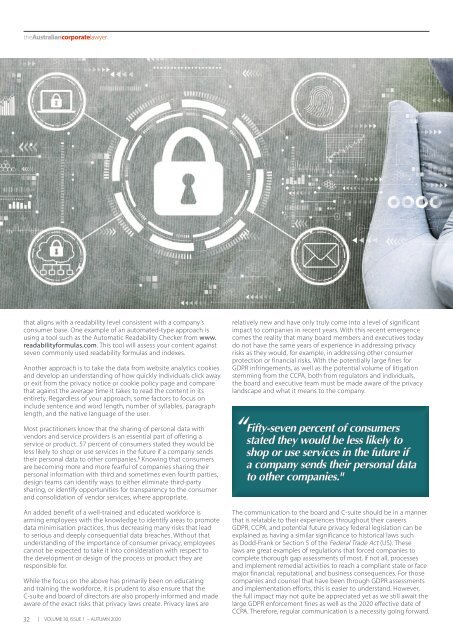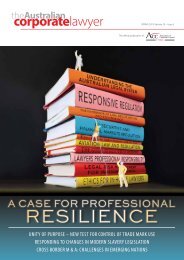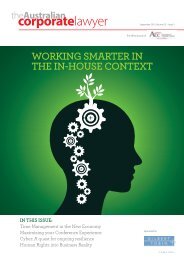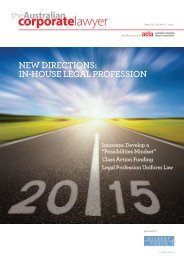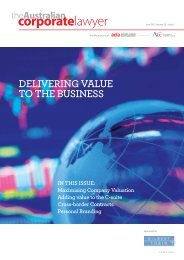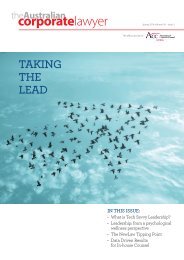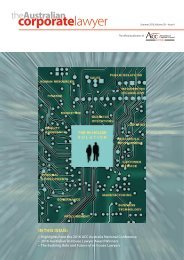Australian Corporate Lawyer - Autumn 2020
Australian Corporate Lawyer is the official publication of the Association of Corporate Counsel (ACC) Australia. The Autumn 2020 issue focuses on contract negotiation and features a range of articles covering topics including the importance of EQ for lawyers; managing employment rights in the social media age and addressing conflict in the workplace.
Australian Corporate Lawyer is the official publication of the Association of Corporate Counsel (ACC) Australia. The Autumn 2020 issue focuses on contract negotiation and features a range of articles covering topics including the importance of EQ for lawyers; managing employment rights in the social media age and addressing conflict in the workplace.
Create successful ePaper yourself
Turn your PDF publications into a flip-book with our unique Google optimized e-Paper software.
the<strong>Australian</strong>corporatelawyer<br />
that aligns with a readability level consistent with a company’s<br />
consumer base. One example of an automated-type approach is<br />
using a tool such as the Automatic Readability Checker from www.<br />
readabilityformulas.com. This tool will assess your content against<br />
seven commonly used readability formulas and indexes.<br />
Another approach is to take the data from website analytics cookies<br />
and develop an understanding of how quickly individuals click away<br />
or exit from the privacy notice or cookie policy page and compare<br />
that against the average time it takes to read the content in its<br />
entirety. Regardless of your approach, some factors to focus on<br />
include sentence and word length, number of syllables, paragraph<br />
length, and the native language of the user.<br />
Most practitioners know that the sharing of personal data with<br />
vendors and service providers is an essential part of offering a<br />
service or product. 57 percent of consumers stated they would be<br />
less likely to shop or use services in the future if a company sends<br />
their personal data to other companies. 5 Knowing that consumers<br />
are becoming more and more fearful of companies sharing their<br />
personal information with third and sometimes even fourth parties,<br />
design teams can identify ways to either eliminate third-party<br />
sharing, or identify opportunities for transparency to the consumer<br />
and consolidation of vendor services, where appropriate.<br />
An added benefit of a well-trained and educated workforce is<br />
arming employees with the knowledge to identify areas to promote<br />
data minimisation practices, thus decreasing many risks that lead<br />
to serious and deeply consequential data breaches. Without that<br />
understanding of the importance of consumer privacy, employees<br />
cannot be expected to take it into consideration with respect to<br />
the development or design of the process or product they are<br />
responsible for.<br />
While the focus on the above has primarily been on educating<br />
and training the workforce, it is prudent to also ensure that the<br />
C-suite and board of directors are also properly informed and made<br />
aware of the exact risks that privacy laws create. Privacy laws are<br />
32 | VOLUME 30, ISSUE 1 – AUTUMN <strong>2020</strong><br />
relatively new and have only truly come into a level of significant<br />
impact to companies in recent years. With this recent emergence<br />
comes the reality that many board members and executives today<br />
do not have the same years of experience in addressing privacy<br />
risks as they would, for example, in addressing other consumer<br />
protection or financial risks. With the potentially large fines for<br />
GDPR infringements, as well as the potential volume of litigation<br />
stemming from the CCPA, both from regulators and individuals,<br />
the board and executive team must be made aware of the privacy<br />
landscape and what it means to the company.<br />
“<br />
Fifty-seven percent of consumers<br />
stated they would be less likely to<br />
shop or use services in the future if<br />
a company sends their personal data<br />
to other companies."<br />
The communication to the board and C-suite should be in a manner<br />
that is relatable to their experiences throughout their careers.<br />
GDPR, CCPA, and potential future privacy federal legislation can be<br />
explained as having a similar significance to historical laws such<br />
as Dodd-Frank or Section 5 of the Federal Trade Act (US). These<br />
laws are great examples of regulations that forced companies to<br />
complete thorough gap assessments of most, if not all, processes<br />
and implement remedial activities to reach a compliant state or face<br />
major financial, reputational, and business consequences. For those<br />
companies and counsel that have been through GDPR assessments<br />
and implementation efforts, this is easier to understand. However,<br />
the full impact may not quite be appreciated yet as we still await the<br />
large GDPR enforcement fines as well as the <strong>2020</strong> effective date of<br />
CCPA. Therefore, regular communication is a necessity going forward.


